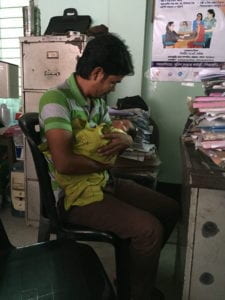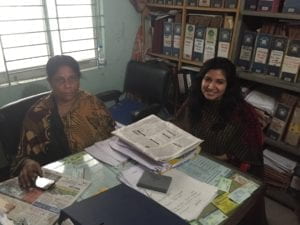Sadia Alam
Bangladesh National Woman Lawyers’ Association
Dhaka, Bangladesh
My time spent at BNWLA this past summer greatly transformed my views of Bangladeshi law and its place in the lives of ordinary citizens. I had entered the summer with a critical view of the legal system and its treatment of women. Yet, through my experiences at the legal center, I learned that the focus of many NGOs here (including BNWLA) is not on drafting new laws, but is instead on providing access to the rights that are already guaranteed. My initial confusion regarding the statement that the law does support women was mitigated when I saw how many laws were created to help women and how many women actually simply did not know that they had rights. There are indeed rights protecting women from physical abuse, property “theft”, dowry abuses, etc. yet so many women were living with these problems quietly with the thought that nothing could be done.

The problem, I have come to realize, lies in the implementation of the laws that protect women. The poor implementation of such laws results in the lack of knowledge and understanding of these rights. For example, dowry is clearly prohibited in Bangladeshi law, yet there were multiple cases at the office regarding dowry – even to the extent of murder of a young woman by her husband due to arguments regarding dowry. Would the woman have lived if she had reported to the police that her husband was demanding dowry from her family? Was she aware that her husband’s demands would cause him to be punished by the law? Through my experiences, however, I have also learned how difficult it is to convince people that you are there to help them. People are simply so skeptical of their surroundings that they are not easily convinced that they can receive free legal aid from NGOs let alone that the legal system is actually in favor of them – especially those who are poor.

Another aspect of the organization’s approach toward finding solutions to the women’s issues that I found interesting is the use and promotion of cultural normatives. Before arriving at the organization I was quite interested in seeing the dichotomy between the law and the culture, but upon arriving here I realized that the two can and should indeed work in harmony in a place like Bangladesh. The women who came to the organization were largely from poorer backgrounds, who already had a great sense of cultural and societal pressures. When mediating their problems, the lawyers often tried to explain their rights against a cultural backdrop. As a result, I did not witness any case where the women felt ostracized or helpless in society because of whatever circumstances they were under (after speaking to lawyers at BNWLA).
I am still quite shocked at how quickly the summer at BNWLA went by! The experiences were truly unforgettable and eye-opening. Everything I have learned will definitely change my approach to the work I do in my future – whether it be in human rights, medicine, or public health. I hope to be able to experience something like this again in the near future to learn more about people’s’ interactions and their narratives in different communities.





